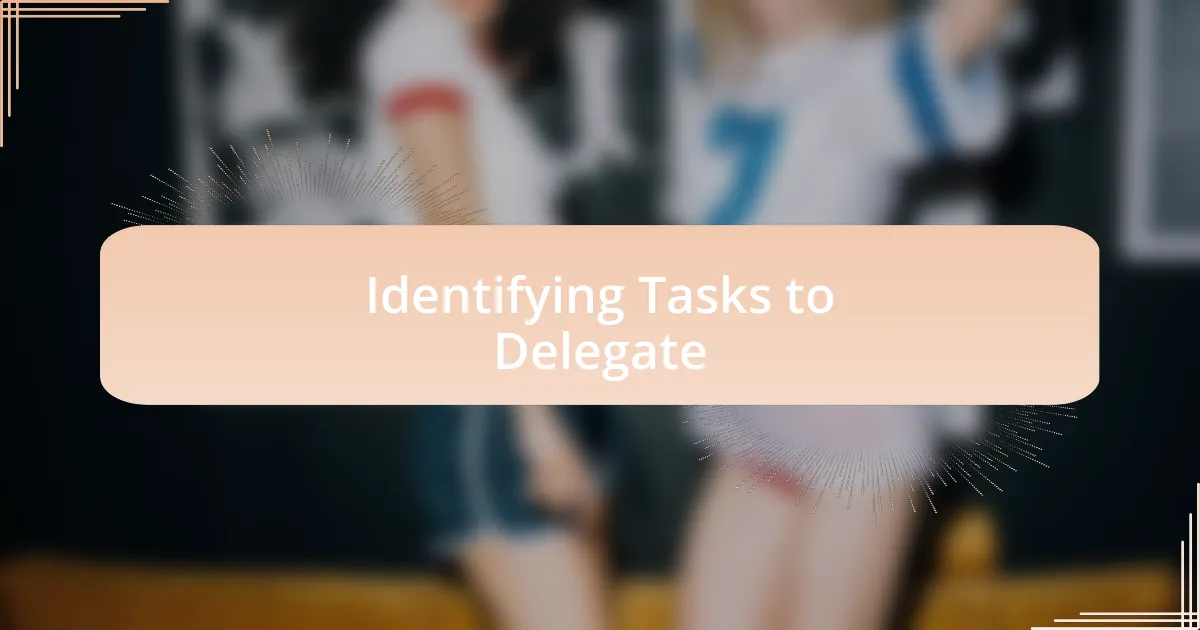Key takeaways:
- Effective delegation in breakdancing enhances performances by utilizing each member’s strengths and fostering teamwork.
- Clear expectations and open communication are crucial for successful delegation, allowing creativity while ensuring alignment.
- Trusting and empowering crew members builds ownership and deepens connections, positively impacting team dynamics.
- Celebrating small wins boosts motivation and morale, nurturing a supportive environment within the crew.

Understanding Delegation Techniques
When I first started breakdancing, I was hesitant to share responsibilities within my crew. I often found myself thinking, “What if they don’t perform it as well as I would?” But I soon realized that effective delegation could elevate our performances rather than diminish them. By assigning specific roles based on each member’s strengths, I watched our routines transform into something more cohesive and powerful.
One technique I discovered is the importance of open communication. I remember one practice session where I encouraged everyone to share their ideas for a new routine. The moment I stepped back and listened, the energy in the room shifted. Suddenly, everyone felt empowered to contribute, leading to innovative moves that I never would have thought of. Trusting my teammates allowed us to create something truly remarkable together.
Another essential aspect of delegation is providing clear expectations. In one instance, I asked a crew member to take the lead on choreography for an upcoming battle. Initially, I didn’t set clear parameters for what I envisioned. The result was a routine that, while unique, didn’t quite align with our style. This experience taught me that when I delegate, it’s crucial to outline what I need while still giving others the freedom to bring their own flair. It’s a balancing act that requires both guidance and trust.

Importance of Delegation in Breakdancing
One major reason delegation matters in breakdancing is the diversity of skills within a crew. I remember a time when I was focused solely on footwork, ignoring the potential of some members who excelled in freezes. By letting them spearhead freeze transitions, our performance took on a whole new level of flair. This taught me that embracing each dancer’s unique strengths can lead to unexpected and electrifying outcomes.
Another key insight I gained is that delegation fosters a sense of ownership among crew members. I once asked a teammate to manage our social media while I focused on choreography. At first, I worried about maintaining our brand image. But as I stepped back, I was amazed to see how my teammate infused their personal style into our posts, engaging our audience in ways I hadn’t anticipated. This kind of ownership not only promotes creativity but also deepens everyone’s connection to the crew.
Finally, trusting others with responsibilities cultivates a supportive environment. I recall feeling overwhelmed before a big competition and nearly decided to take everything on myself. But instead, I leaned on my crew to handle warm-ups and logistics. Watching them step up not only lightened my load but also strengthened our bond. It made me reflect: Isn’t the essence of breakdancing built on unity and collaboration? In that moment, I understood that delegation is more than sharing tasks; it’s about nurturing a team spirit that propels us all forward.

Identifying Tasks to Delegate
When it comes to identifying tasks to delegate in breakdancing, I’ve found that assessing each crew member’s strengths is crucial. For instance, I once had a dancer who was a whiz at organizing events. It became clear to me that by letting her handle our show logistics, I could focus on improving my moves instead of stressing over schedules. Isn’t it fascinating how someone’s passion can transform a seemingly mundane task into a thriving part of our crew culture?
Another effective strategy I’ve used is mapping out the roles needed for a successful performance. I started creating a checklist of tasks: choreography, music selection, costume design, and promotion. This exercise not only highlighted what I could hand off but also illuminated gaps where we could grow. Have you ever felt that rush of realizing you have a hidden gem in your crew? For me, discovering a teammate’s knack for costuming was a game-changer; it allowed us to elevate our visual presentation.
Lastly, I’ve learned that understanding the timeline of events is essential for delegating effectively. I remember when we were gearing up for a competition, and I was overwhelmed by the looming deadlines. By breaking everything down into smaller, manageable tasks, I confidently assigned responsibilities based on each person’s availability. Reflecting on that experience, I realized how delegation becomes not just about sharing the workload but also about empowering others to shine when needed most.

Choosing the Right Individuals
Choosing the right individuals for delegation in breakdancing isn’t just about skill; it’s about trust and teamwork. I recall a time when I hesitated to hand over teaching a new routine, fearing my trusted dancer might not execute it as I envisioned. However, when I finally let go, I discovered her unique flair brought a fresh perspective that rejuvenated our performance. Isn’t it incredible how stepping back can sometimes lead to unexpected brilliance?
It’s also important to consider the personalities of your crew members. I remember working with a quieter dancer who never spoke up but had a wealth of ideas. Encouraging her to lead our video editing project unleashed her creativity in ways I never anticipated. This taught me that sometimes, the most reserved individuals possess insights that can elevate our collective vision.
Finally, evaluating a crew member’s commitment is vital. I once assigned a crucial role to someone who seemed eager but lacked follow-through. When the deadline approached, I realized my mistake and learned that enthusiasm must be matched with reliability. Have you ever delegated something only to find yourself taking over again? This experience reinforced my understanding that while passion is essential, a dependable attitude is what truly makes teamwork thrive.

Strategies for Successful Delegation
One effective strategy for successful delegation is to set clear expectations. I recall a moment when I asked a fellow dancer to handle our choreography for an upcoming battle without outlining my vision. The result? A beautifully unique routine that strayed too far from what I had in mind. This taught me that providing context upfront can empower others while ensuring we’re aligned in our objectives. Have you ever felt lost trying to meet vague requests? Clarity transforms delegation from guesswork into collaboration.
Another valuable approach is to create a feedback loop. I used to think once I delegated a task, my involvement should be minimal. But I quickly learned that checking in regularly was key. I remember how anxiety bubbled up during a competition as our team prepared a performance assigned to someone new. Just a quick chat revealed concerns and potential enhancements that boosted our confidence. Isn’t it reassuring to know that regular communication fosters growth and helps refine creativity?
Lastly, celebrating small wins can significantly enhance the delegation process. I vividly recall when a young b-boy I guided led our warm-up for the first time. Initially hesitant, he spoke up, and when we cheered him on afterward, his pride lit up the room. Recognizing achievements, no matter the size, cultivates motivation and boosts morale. What would your crew feel like if every step forward was celebrated? Acknowledgment not only nurtures enthusiasm but also builds a resilient team dynamic.

Personal Experience with Delegation
I remember the first time I tried to delegate a task to my crew—it was during a local jam. I asked a fellow b-girl to coordinate our outfits, thinking it would free me up to focus on the choreography. Instead, I found myself stressed when I saw mismatched styles they had chosen. It was a wake-up call for me. I learned that if I wanted to let go, I needed to be involved in the decision-making process, ensuring everyone’s on the same page. Doesn’t it make a difference when you feel connected to the overall vision?
There was another time when I took a leap and delegated the role of leading our practice sessions to a younger dancer. At first, I was apprehensive; would they rise to the occasion? Yet, to my surprise, their fresh perspective and enthusiasm revitalized our workouts. I watched them experiment with new moves, and it made me realize that giving up control can breathe new life into our routines. What have you ever missed by holding on too tightly to the reins?
Reflecting on these experiences, I understand that delegation isn’t just about assigning tasks—it’s about trust. Trusting others can feel vulnerable. There are moments when I feared stepping back would lead to chaos rather than creativity. But in my journey, I learned that delegating, when done thoughtfully, nurtures a culture of collaboration and growth. Isn’t it amazing how sharing responsibilities can bring out the best in each dancer?